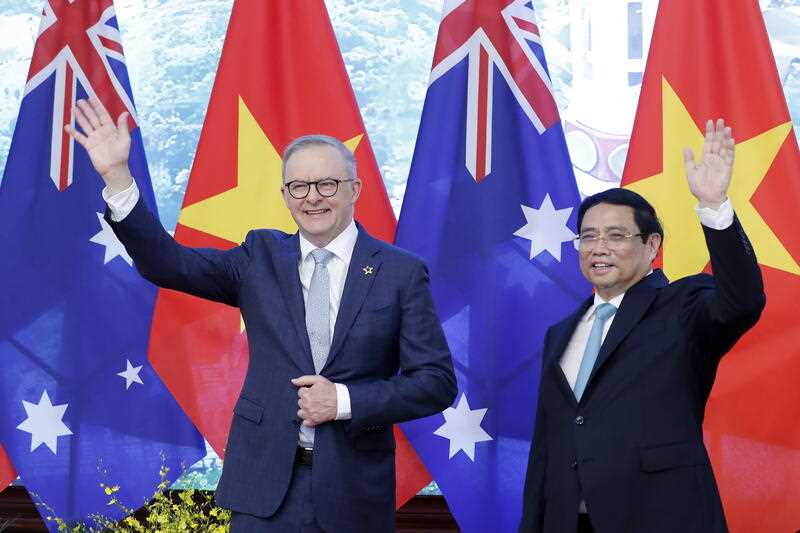Anthony Albanese has promised Australia will support Vietnam to transition to clean energy during a diplomatic push, as China’s role in Asia looms over the relationship.
The prime minister sat down with his Vietnamese counterpart Prime Minister Pham Minh Chinh, as well as the Communist Party general secretary, the president and the chairman of the national assembly on Saturday.
Following a bilateral meeting on his final day of a whirlwind tour of the region, Mr Albanese announced a $105 million package to help Vietnam combat climate change.
The funding will support sustainable infrastructure planning, stimulate private investment in clean energy infrastructure and provide assistance for Vietnam to develop its critical mineral sector.
“It is through our people coming together that we unleash our best ideas and we forge our deepest bonds,” Mr Albanese said.
“All of this connection and cooperation comes together in our plans to elevate our relationship to a comprehensive strategic partnership … to signal the trust that we have in each other as top-tier partners and enduring friends.”
But the issue of Vietnam’s relationship with China was also high on the leader’s meeting agenda.
Last week, Vietnam accused a Chinese survey vessel and its escorts of violating its sovereignty amid a territorial dispute involving the South China Sea.
Mr Albanese said Australia and Vietnam shared the same views on the South China Sea, and maritime laws in the region needed to be maintained.
“The prime minister and I discussed our shared vision of an open, stable, secure, prosperous and resilient Indo-Pacific that is respectful of national sovereignty,” he said.
After meeting with representatives of the Vietnamese women’s under-20 football team, Mr Albanese reflected on how diplomatic relations could learn from the sporting field.
“What team sport does and shows us is the way we want international relations to work as well, working towards that common interest with common rules, with mutual respect,” he said.
Although it was his first visit to Vietnam as prime minister, Mr Albanese noted he had travelled to the country three times before.
He made sure to fit in a banh mi and beer in Hanoi before participating in a wreath-laying ceremony at the Ho Chi Minh Mausoleum, the resting place of the country’s communist revolutionary leader.
Mr Albanese was welcomed to the Presidential Palace by a guard of honour and schoolchildren who waved flags.
He will later attend an official dinner hosted by Prime Minister Chinh before he returns to Australia.
On Saturday, Defence Minister Richard Marles met with his Chinese counterpart Li Shangfu in Singapore after Mr Albanese delivered a major foreign policy speech in which he called out the risks from any unilateral attempt to change the status quo in Taiwan or the South China Sea by force.
Mr Marles admitted Australia was “walking a line” in addressing a more aggressive China while also trying to improve trade and diplomatic relations with Beijing.
But in a speech on Sunday, Mr Marles pointed to Russia’s invasion of Ukraine as a warning for those closer to home.
“Russia’s invasion represents a broader failure of the global system to deter the use of force in pursuit of strategic goals and we must not allow this to become a dangerous new precedent for our own region,” he said.
“China is engaging in the largest conventional military build-up the world has seen since the Second World War and this build-up is happening without an explanation of its strategic purpose.
“China is not providing our region or the world with any strategic reassurance.”
By Maeve Bannister in Canberra



